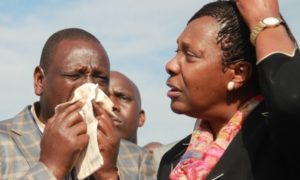
By Reinhard Asamoh
Kenya has undergone a raft of reform processes ranging from political to governance, with devolution being the most transformative regarding equity and redistribution of resources. Some have largely viewed devolution as the panacea to a myriad of challenges in Kenya that have been attributed to the unequal distribution of resources among other structural causes.
Conversely, devolution is also being associated with new and emerging challenges. With the devolution, health is now a function of the County governments – the devolution of health budgets has meant an elimination of the traditional HIV /TB /Malaria Budget lines accompanied by inadequate allocations to health sector by the County governments.
Whilst procurement of vaccines remains the responsibility of the national level MOH, procurement of injectable devices (e.g.,. syringes), and budget setting for operations costs has been devolved to the county level. The challenges have led to poor performance of the health sector, and this could get worse if key stakeholders are not engaged and sensitised for national and sub-national governments’ political action to improve health funding and policies.
Furthermore, with the rebasing of the Kenyan economy, Kenya is now a Lower Middle Income Country. Development partners such as The Global Fund and Gavi would take the new income classification in consideration as funding allocations are made, and co-financing commitments by the government are calculated. Similarly, a study carried out by the National AIDS Control Council on Implications to Health (HIV) due to Middle Income Country (MIC) status confirmed there would be short and long term implications at country-level and to program needs.
Thus, there is a need to support advocacy efforts at the country level in Kenya to find more sustainable approaches to health financing in implementing countries. Domestic expenditures for health are particularly vital, and developing countries are already making greater investments in their health systems.
Under the funding model, The Global Fund has entered into an agreement with Kenya for funding support of $ 332 Million through 2017. Kenya has committed $26 million in the FY 2015/16 in domestic financing for health, and it is critical to sustaining the momentum. Gavi’s support for Kenya will be $32 million in 2016, and Kenya is required to co-procure a total amount of $3.4 million for the Gavi supported vaccines in the FY 2016/17.
Mobilising more domestic funds is key in helping to ensure health program sustainability as Kenya transitions from international support in the medium term to long term. Kenya needs to increase the prioritisation given to health in the national budget.
At present Kenya only spends around 5.6% of its budget on health, much lower than its commitment made in Abuja in 2001 to allocate at least 15%. Now as a Lower-middle-income country, with the possibility of losing some of its traditional donors in health in the medium term to long term, Kenya has one of the most vibrant economies in Sub-Saharan Africa. It also poses a significant opportunity to change the equation where 45% of health sector services are funded by donor aid.
There is a chance to change the allocation of funds to health, as well as increased domestic development vote vis-à-vis the recurrent expenditure budgets. According to a study by the Kenya German development cooperation, more that 75% of the health budget is allocated to recurrent expenses. Evidence has also shown that the increase of the budget on health over the years have been low since as budgets have been increased nominally, there have also been rates of inflation.
A study published in 2015 by Results UK, KANCO, WACI Health and Action, “Who Pays for Progress? The Roles of Domestic Resource Mobilization and Donor Aid for Health Financing in Africa” showed that Kenya and countries like it should be wary of the potential health precipice on which they may find themselves given the huge gaps in domestic health financing.
With increased domestic resource mobilisation for health and a graduation and transitions scheme from donors such as the Global Fund and Gavi, the integration or building of human rights-based solutions for access to health services is critical for accountability, transparency, and equity. Supporting transition countries to expand human rights programs to remove human rights and gender-related obstacles to health care and to empower communities to take charge of their health is central to the Global Fund’s transition strategy.
Similarly, gender equality and ensuring the needs and rights of women and girls are enhanced would sustain and improve progress in health outcomes. Gender dynamics within epidemics such as AIDS are such that women and girls are disproportionately affected, as are MSM and trans communities and other key affected populations.
In 2001, heads of states of the African Union made the Abuja Declaration — a commitment to allocate at least 15 percent of their annual budgets to the health sector by 2015. Kenya is one of those countries which have yet to achieve this target. Though significant progress has been made within domestic financing efforts, not enough is being done currently to mobilise domestic resources. Kenya, like many countries with the heaviest disease burden, is unable to fund their responses to AIDS, TB and malaria, and their immunisation programme without international support.
However, Kenya is progressively graduating from international support as its economy grows. Securing political will is key for the Kenyan government to mobilise more domestic resources and increase spending on health in line with its Abuja commitments, and the role of Parliamentarians from all parties is critical to achieving this outcome.
There is the need to highlight the importance and return on investment of investing in health budgets, and promote increased domestic contributions to HIV, TB, Malaria and Immunization.
Asamoh is an economist and contributor on Kenya’s affairs
Twitter: @Asamoh_
This article expresses the author’s opinion only. The views and opinions expressed here do not necessarily represent those of Kenya Insights or its Editors. We welcome opinion and views on topical issues. Email: [email protected]
Kenya Insights allows guest blogging, if you want to be published on Kenya’s most authoritative and accurate blog, have an expose, news TIPS, story angles, human interest stories, drop us an email on [email protected] or via Telegram

 Investigations2 weeks ago
Investigations2 weeks ago
 Investigations2 weeks ago
Investigations2 weeks ago
 Investigations2 weeks ago
Investigations2 weeks ago
 Investigations1 day ago
Investigations1 day ago
 Investigations2 weeks ago
Investigations2 weeks ago
 Investigations2 weeks ago
Investigations2 weeks ago
 Investigations2 weeks ago
Investigations2 weeks ago
 Business1 week ago
Business1 week ago




























